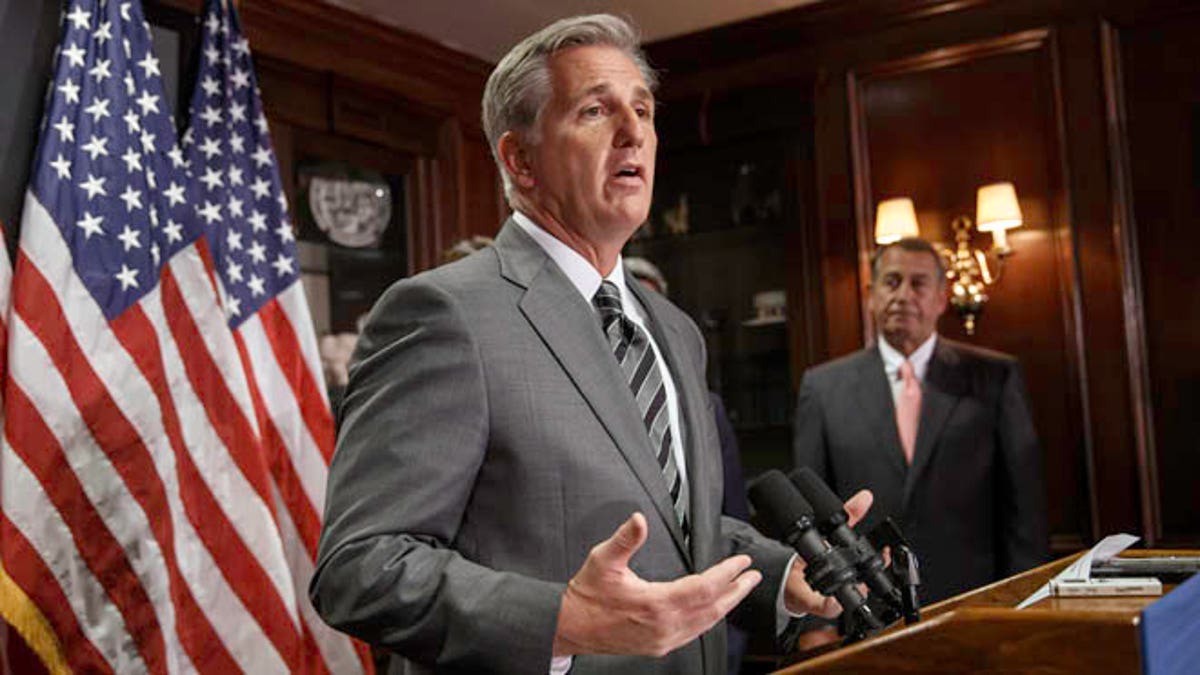
June 24, 2014: Incoming House Majority Leader Kevin McCarthy, joined at right by House Speaker John Boehner, meets with reporters on Capitol Hill. (AP)
Critics blast it as a taxpayer-funded institution of "crony capitalism" fraught with corruption. Supporters say it's a job creator and levels the global playing field. Both sides know that the future of the Export-Import Bank now hangs in the balance, with its fate firmly resting in the hands of the House Republican Conference.
The Ex-Im Bank, as it's known, has been around for some 80 years, as a federal agency providing financing to foreign buyers of American exports -- basically boosting American companies shipping their goods overseas. Dozens of other countries have a similar set-up.
But now Congress has until Sept. 30 to renew the bank's charter and operating budget. That's roughly $115 million, according to a report from the Congressional Research Service.
Re-upping hasn't been a problem, in the past.
In fact, the House last voted to renew the charter with overwhelming bipartisan support -- 143 Republicans voted for it, including incoming House Majority Leader Kevin McCarthy, R-Calif.
Times have changed. McCarthy now says the bank should be put out of business.
"One of the problems with government is it's going to take hard-earned money so others do things that the private sector can do. That's what Ex-Im Bank does," McCarthy said during a recent interview on "Fox News Sunday." "The last authorization of the Ex-Im Bank directed the president and the Treasury secretary to wind down the Ex-Im Bank, negotiate with other countries, to wind them down so we have a level playing field," he added, explaining his most recent vote.
There are other arguments which have conservatives clamoring to pull the plug, including those claims of crony capitalism.
In 2012, more than 80 percent of the Export-Import Bank's subsidies went to support Boeing, and earned Ex-Im the moniker, "Boeing's Bank."
House Financial Services Committee Chairman Jeb Hensarling, R-Texas, opened his hearing last week on the bank saying, "if you're a politically connected bank or company that benefits from Ex-Im, no doubt you would like it to continue. After all, it's a sweetheart deal for you. Taxpayers shoulder the risk and you get the reward."
CEO of Delta Air Lines Richard Anderson echoed similar sentiments while testifying during that hearing, saying taxpayer cash benefiting Boeing could end up costing Delta jobs.
"This is about putting safeguards in place so [Congress] is not choosing which companies win and which companies lose," Anderson said.
Then, there are the claims of corruption.
The Wall Street Journal reports the Export-Import Bank either suspended or outright removed four officials in recent months over allegations they took gifts and kickbacks and attempted to steer federal contracts to certain companies.
Still, not all Republicans want the Ex-Im Bank to fold.
Forty-one signed a letter last week in favor of renewing its charter. While companies like Boeing, Caterpillar and General Electric get the lion's share of the subsidies, many Republican lawmakers are feeling pressure from the Chamber of Commerce, the National Association of Manufacturers, and small businesses in their home districts that also benefit from the bank.
"I think that it's very important to our businesses. They made a very strong case," Texas Republican Rep. Kay Granger said after speaking with constituents.
Other House Republicans are searching for middle ground. Rep. John Campbell, R-Calif., is crafting a proposal to renew the bank's charter, but with reforms, like slashing its lending cap by a third and lifting a ban on funding for coal-fired power projects.
Senate Democrats see a potential opening. They're planning a vote later this month.
"I think if we can pass it in the Senate, and particularly with a good bipartisan majority, there is more friendliness among Republicans for this bill, that it will put pressure on the House," Sen. Chuck Schumer, D-N.Y., said this week in a conference call with reporters.
Still, while there are enough votes in the House to pass the bill, it remains to be seen if leadership will put it on the floor -- even if it has reforms.
"Every Ex-Im reauthorization bill in the past has included 'reforms' to guard against various transgressions, such as giving almost all subsidy dollars to big companies or subsidizing foreign competitors with U.S. companies. Past Ex-Im reforms have been feckless, so there's no reason to expect that new ethics reforms will be any better," Tim Carney, a scholar at the conservative American Enterprise Institute, wrote.
"If GOP talk on crony capitalism is more than empty rhetoric, then House Republicans will unite to kill Ex-Im, not try yet again to reform it."
Capitol Attitude is a weekly column written by members of the Fox News Capitol Hill team. Their articles take you inside the halls of Congress, and cover the spectrum of policy issues being introduced, debated and voted on there.




